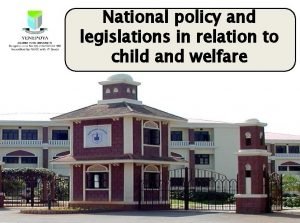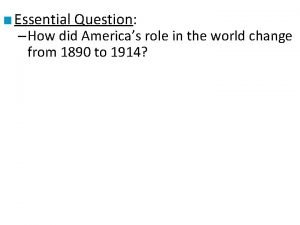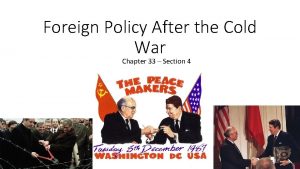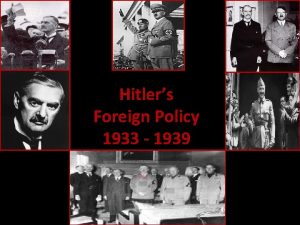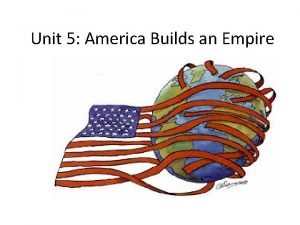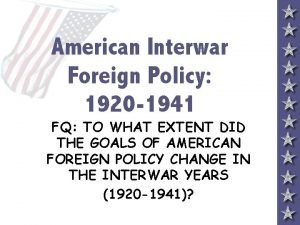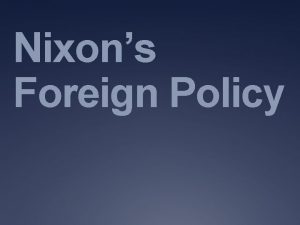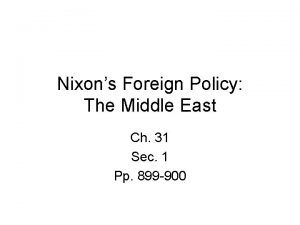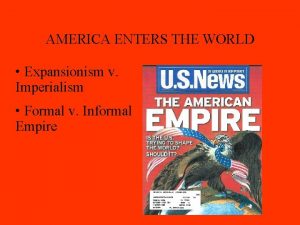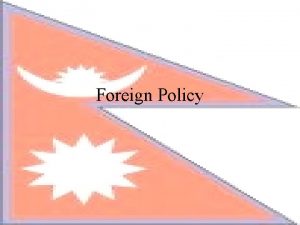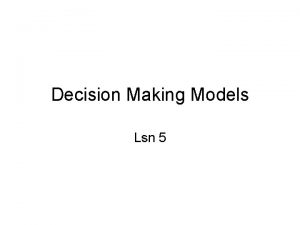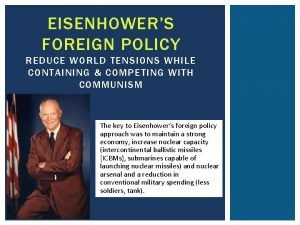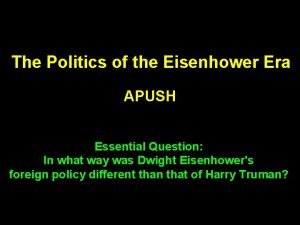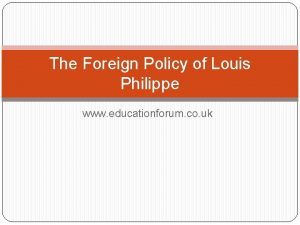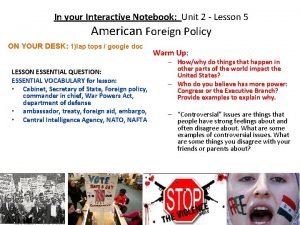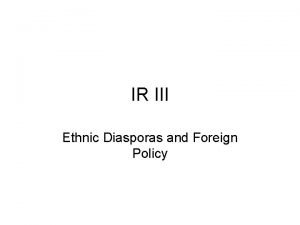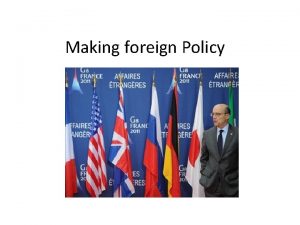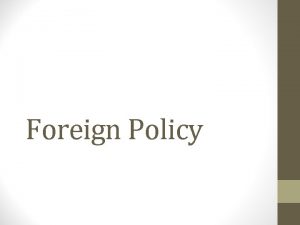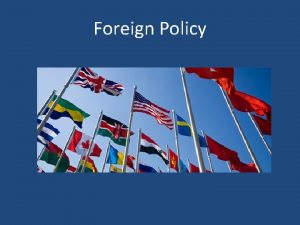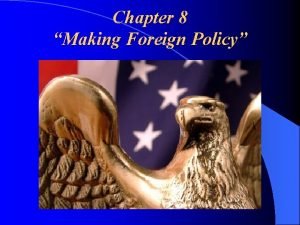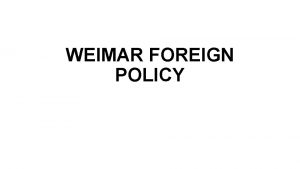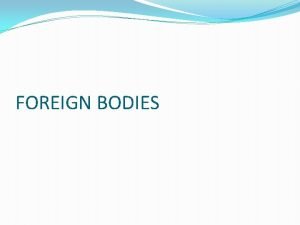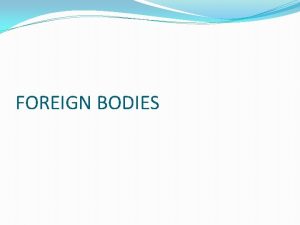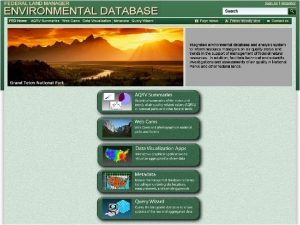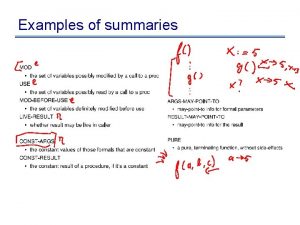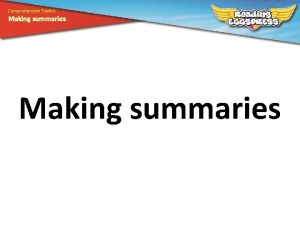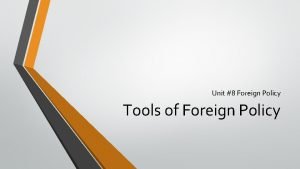EU Foreign Policy Legislation Summaries of EU legislation























- Slides: 23

EU Foreign Policy

Legislation �Summaries of EU legislation on foreign affairs and security policy / External relations / Humanitarian aid / External trade / Development and cooperation / Human rights and democracy / Fight against organised crime �Treaty on European Union - Articles 21 -46 (external action and common foreign & security policy) �Treaty on the Functioning of the European Union Articles 205 -222 (common commercial policy)

�EU foreign and security policy, which has developed gradually over many years, enables the EU to speak and act as one in world affairs. Acting together gives the EU's 28 members far greater clout than they would have if each pursued its own policies.

�The 2009 Lisbon Treaty strengthened this policy area by creating �the post of EU High Representative for Foreign Affairs & Security Policy �the European External Action Service (EEAS) – the EU's diplomatic corps.

�Peace & security �EU foreign and security policy seeks to �preserve peace & strengthen international security �promote international cooperation �develop & consolidate � - democracy � - the rule of law � - respect for human rights & fundamental freedoms

Diplomacy & partnership � EU election observers at Pakistan's 2013 general elections � The EU is a key player on issues ranging from Iran's nuclear programme and stabilising Somalia and the wider Horn of Africa to global warming. Its joint foreign and security policy, designed to resolve conflicts and foster international understanding, is based on diplomacy; trade, humanitarian aid, security and defence often play a complementary role. � The world's largest donor of development finance, the EU is uniquely well-placed for cooperation with developing countries.

�The sheer demographic and economic weight of the 28 -nation bloc makes it a major power. It is the world’s biggest trader, with the world’s second currency, the euro. The trend towards joint foreign policy decisions strengthens its arm. �The EU maintains partnerships with the world's key players, including emerging powers. It seeks to ensure that these relationships are based on mutual interests and benefits, with rights and duties for both sides.

� The EU maintains partnerships with the world's key players, including emerging powers. It seeks to ensure that these relationships are based on mutual interests and benefits, with rights and duties for both sides. � The EU holds regular summits with the United States, Japan, Canada, Russia, India and China. Its international relations encompass � education � the environment � security & defence � crime � human rights.

Peacekeeping missions � The EU has sent peacekeeping missions to several of the world’s trouble spots. In August 2008, it helped broker a ceasefire between Georgia and Russia, deployed EU observers to monitor the situation (EU monitoring mission in Georgia) and provided humanitarian aid to people displaced by the fighting. � In the Balkans, the EU funds projects designed to help 7 countries build stable societies. A strong police and justice force (EULEX Kosovo) is in place to help ensure law and order.

The means to intervene � EULEX hands out info on EU role in Balkan reconstruction � The EU has no standing army. Instead, under its common security and defence policy (CSDP), it relies on ad hoc forces contributed by EU countries for: � joint disarmament operations � humanitarian & rescue tasks � military advice & assistance � conflict prevention & peacekeeping � crisis management, e. g. peacemaking & post-conflict stabilisation.

� Since 2003 the EU has carried out some 30 civilian missions and military operations on 3 continents. They have all been responses to crises: � post-tsunami peace-building in Indonesia � protecting refugees in Mali & the Central African Republic � fighting piracy off Somalia and the Horn of Africa. � The EU's role as a security player is expanding. � Since January 2007, it has been able to carry out rapid-response operations with 2 concurrent single-battle groups, each comprising 1500 soldiers. If necessary, 2 operations can be launched almost simultaneously. Deployment decisions are taken by national ministers from EU countries meeting in the Council of the EU.

A partnership eastwards �As the EU has expanded, the countries of eastern Europe and the southern Caucasus have become closer neighbours. Increasinlgly, their security, stability and prosperity affect ours. Closer cooperation between the EU and its eastern European partners – Armenia, Azerbaijan, Belarus, Georgia, the Republic of Moldova and Ukraine – is a key element in EU foreign relations.

Closer ties: Mediterranean & Middle East � In the wake of the 2011 Arab Spring, the EU re-launched its European neighbourhood policy to express its solidarity with those calling for democracy. Designed to strengthen the EU’s relations with its neighbours to the east and south, the policy offers: � political association � economic integration � increased mobility for people. � The EU continued to support the transition to democracy in north Africa and the Middle East, despite much political instability and struggling economies.

� An EU-Tunisia Task Force coordinates European and international support to help Tunisia on its way to democracy and a stronger economy. A similar EU-Egypt Task Force was set up in November 2012. � The EU supports international efforts to bring peace to the Middle East in a different way. It favours a 2 -state arrangement with the Palestinian state living side-by-side with Israel. The EU, the UN, the US and Russia (the 'Quartet') are working together to encourage both sides to reach an agreement. � In early 2013 the Iranian nuclear programme was one of the most pressing sources of tension internationally. November's landmark agreement with the international community was a first step towards resolving the issue. This was a tribute to the EU's role in leading peace talks on behalf of the international community.

Asia & Latin America �The EU is stepping up relations with regional groups in Asia and Latin America. With its fast-developing Asian partners, it has created ‘enhanced partnerships’ – agreements combining economic, political, social and cultural elements.

Future EU membership: the Balkans � Croatia became the 28 th EU member in July 2013, whilst the former Yugoslav Republic of Macedonia (FYROM), Montenegro and Serbia have been officially accepted as prospective members. Albania and Bosnia and Herzegovina have applied. � 2013 saw a breakthrough in dialogue between Serbia and Kosovo. Though Kosovo declared independence from Serbia in 2008, its international status remains undecided. Thanks to the EU's commitment to brokering talks, the 2 parties reached a landmark agreement in April 2013. This was a testament to the persistence of former High Representative Catherine Ashton and the Prime Ministers of Serbia and Kosovo, and to the EU's strong commitment to peace and reconciliation in the Western Balkans. It also showed that people and countries in Europe continue to seek closer ties with the EU.

Decision-making in EU foreign policy � The ultimate decision-making body in the European Union is the European Council, bringing together heads of state and government from the bloc's 28 countries. It meets 4 times a year to define policy principles and general guidelines. � Federica Mogherini, High Representative of the Union for Foreign Affairs and Security Policy / Vice-President of the Commission � The High Representative's role is to make EU foreign and security policy more consistent. Accordingly, she chairs the monthly meeting of the Foreign Affairs Council (comprising the EU's 28 Foreign Ministers). She also attends the European Council and reports on foreign affairs issues. � Most foreign and security policy decisions require the agreement of all EU countries. � The role of the External Action Service (EEAS) is to support the High Representative. It acts as the EU's diplomatic service. A network of over 139 Delegations and Offices around the world promotes and protects Europe's values and interests


EU institutions and bodies �European Parliament �Committee on foreign affairs (AFET) �Subcommittee on human rights (DROI) �Subcommittee on security and defence (SEDE) �Committee on development (DEVE) �Committee on international trade (INTA)

�Council of the European Union �General affairs �Foreign affairs

�European Commission �EU around the world �European neighbourhood policy �Humanitarian aid and civil protection �Europe. Aid development and cooperation �External trade �Enlargement

�European External Action Service �European Economic and Social Committee �External relations section

� Committee of the Regions � Commission for citizenship, governance, institutional affairs and external relations (CIVEX) � European Investment Bank � African, Caribbean and Pacific (ACP) � Asia and Latin America (ALA) � Facility for Euro-Mediterranean Investment and Partnership (FEMIP) � EU agencies � European Institute for Security Studies (ISS) � European Union Satellite Centre (EUSC) � European Defence Agency (EDA)
 National policies related to child health and welfare
National policies related to child health and welfare Here you are too foreign for home
Here you are too foreign for home Foreign policy imperialism
Foreign policy imperialism Foreign policy
Foreign policy Chapter 33 section 4 foreign policy after the cold war
Chapter 33 section 4 foreign policy after the cold war Hitlers foreign policy
Hitlers foreign policy Foreign policy
Foreign policy 1790 foreign policy
1790 foreign policy Interwar foreign policy
Interwar foreign policy Manchuria apush
Manchuria apush Whats vietnamization
Whats vietnamization Nixons foreign policy
Nixons foreign policy Foreign policy imperialism
Foreign policy imperialism What is foreign policy analysis
What is foreign policy analysis Actors in foreign policy
Actors in foreign policy Eisenhowers foreign policy
Eisenhowers foreign policy Open skies apush
Open skies apush Foreign policy of louis philippe
Foreign policy of louis philippe Hitler's foreign policy timeline
Hitler's foreign policy timeline Expansionist synonym
Expansionist synonym Lesson 5: american foreign policy
Lesson 5: american foreign policy Actors in foreign policy
Actors in foreign policy Conclusion of foreign policy
Conclusion of foreign policy Andrew johnson foreign policy
Andrew johnson foreign policy
